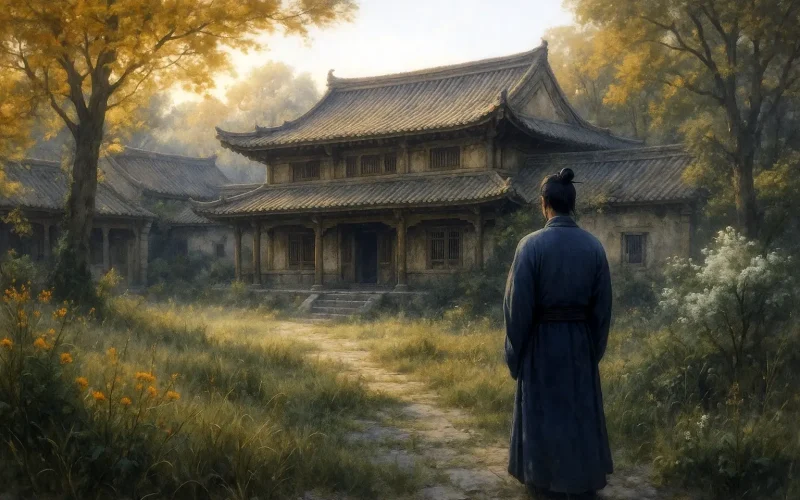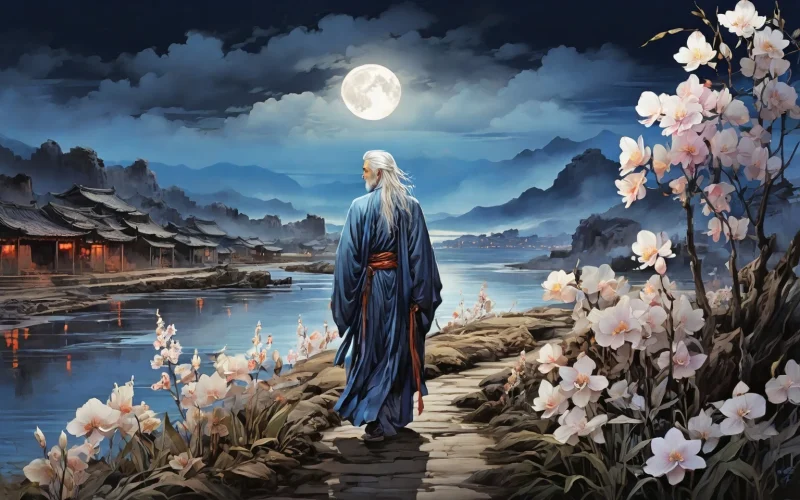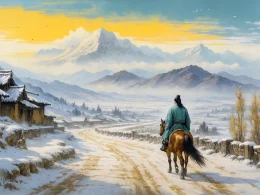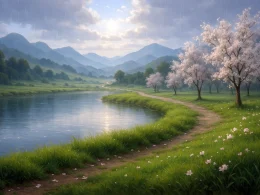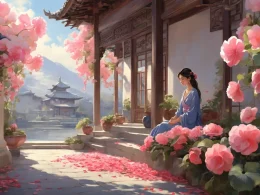The changeless hills round ancient capital still stand;
Waves heating on ruined walls, unheeded, roll away.
The moon which shone by riverside on flourished land
Still shines at dead of night over ruined town today.
Original Poem:
「金陵五题 · 石头城」
刘禹锡
山围故国周遭在,潮打空城寂寞回。
淮水东边旧时月,夜深还过女墙来。
Interpretation:
Liu Yuxi, a Tang dynasty poet, composed Five Poems of Jinling in 826 CE during the second year of Emperor Jingzong’s Baoli reign. At that time, Liu was returning to Luoyang after completing his term as governor of Hezhou. Passing through Jinling (present-day Nanjing), he was filled with deep emotion for the once-glorious yet now-abandoned capital of the Six Dynasties. This poem, inspired by the scenery of Shitou City, reflects his profound lament for the rise and fall of dynasties and the transience of human affairs.
First Couplet: “山围故国周遭在,潮打空城寂寞回。”
(The mountains still surround the abandoned capital as they always have; the tides strike the desolate city, their echoes returning in solitude.)
The opening couplet depicts the mountains and waters, presenting the desolation of Shitou City. The encircling mountains bear silent witness to history's changes, while the tides’ melancholy echoes amplify the sense of emptiness. This contrast evokes a poignant sense of constancy in nature juxtaposed with the impermanence of human endeavors.
Second Couplet: “淮水东边旧时月,夜深还过女墙来。”
(The moon that rises over the Qinhuai River’s eastern bank is the same as in times past; deep into the night, it quietly crosses the crumbling battlements.)
The second couplet uses the moon as a symbol, highlighting its enduring presence amidst the ruins of the city. The moon, once a silent observer of the Six Dynasties’ prosperity, now casts its light on a forlorn landscape. Through the imagery of the “old moon” and the “crumbling battlements,” the poet conveys his nostalgic sorrow for the vanished splendor of the past.
Writing Features:
- Emotion Infused with Scenery: The poet seamlessly blends personal sentiment with depictions of nature and historical relics, achieving a harmonious fusion of emotion and imagery.
- Contrast Technique: The permanence of the natural world is contrasted sharply with the transience of human affairs, particularly through the juxtaposition of the “old moon” and the “desolate city.”
- Subtlety and Depth: Instead of direct expression, the poet employs imagery such as “tides striking the empty city” and “the old moon” to evoke his feelings, leaving room for imagination and lingering resonance.
- Lingering Melody: The verses flow with a natural rhythm, evoking the sound of tides and the quiet murmurs of the moonlit night, creating an ethereal atmosphere.
Overall Appreciation:
Focusing on the theme of Shitou City, the poem uses imagery of mountains, waters, the moon, and crumbling walls to portray the decline and desolation of the ancient capital of Jinling. The poet meditates on the impermanence of glory and laments the passing of time, weaving together his personal feelings of loneliness with the broader historical narrative. The first couplet sets the scene with desolate mountains and waters, while the second couplet uses the moon to highlight the passage of time and historical change. Though the landscape is still and silent, the poem’s rich implications suggest the once-flourishing Six Dynasties gradually fading into the depths of history, leaving behind only cold moonlight and crumbled ruins.
Insights:
Through his depiction of Jinling’s mountains, rivers, and ruined city, the poet reminds readers of the cyclical nature of human and historical prosperity, akin to the waxing and waning of the moon. This poem prompts contemplation of the fleeting nature of wealth and grandeur, urging people to cherish the present and rise above material pursuits. Instead, it encourages the pursuit of higher, more enduring spiritual aspirations.
Poem translator:
Xu Yuan-chong (许渊冲)
About the poet:
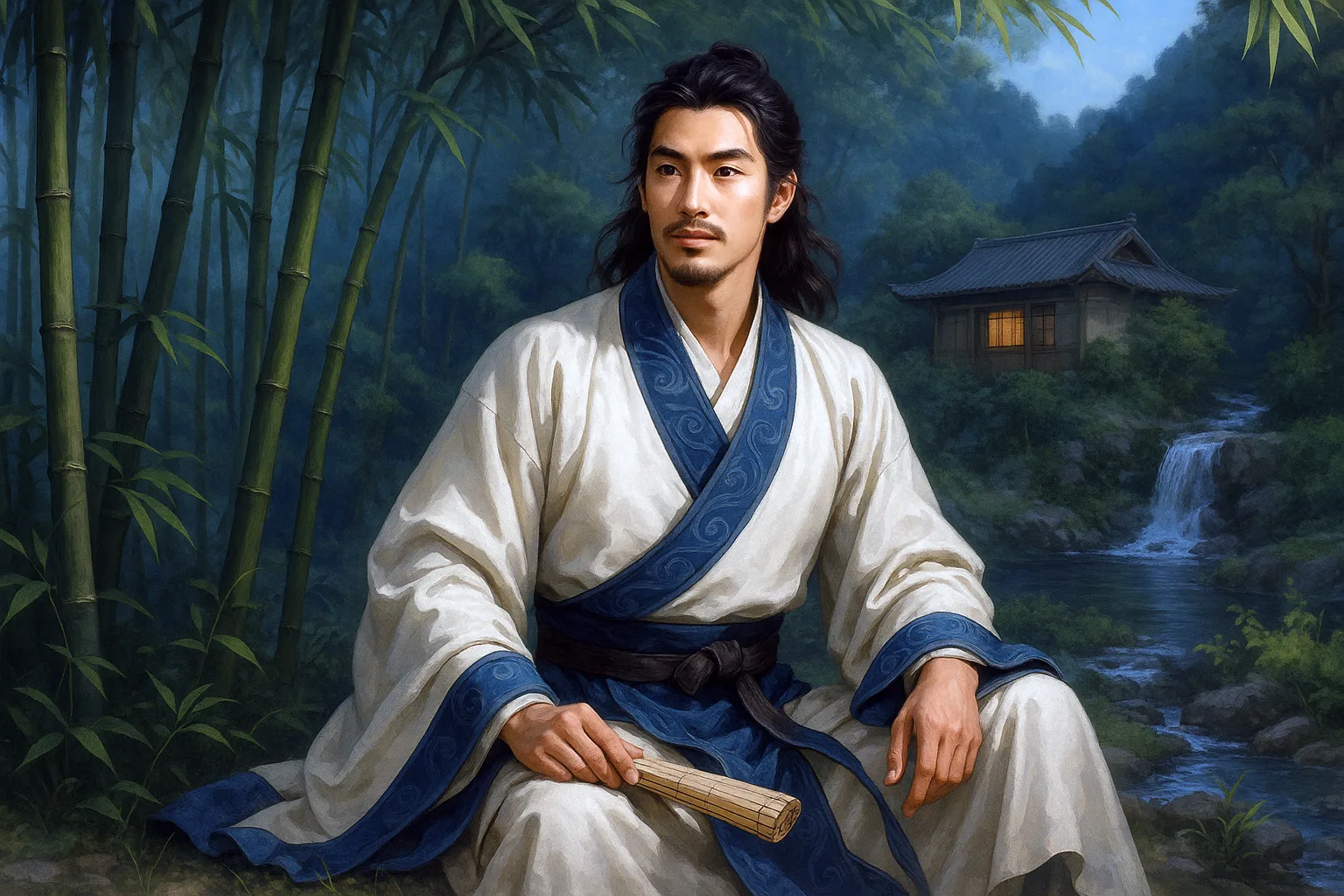
Liu Yuxi(刘禹锡), 772 - 842 AD, was a native of Hebei. He was a progressive statesman and thinker in the middle of the Tang Dynasty, and a poet with unique achievements in this period. In his compositions, there is no lack of poems reflecting current affairs and the plight of the people.







